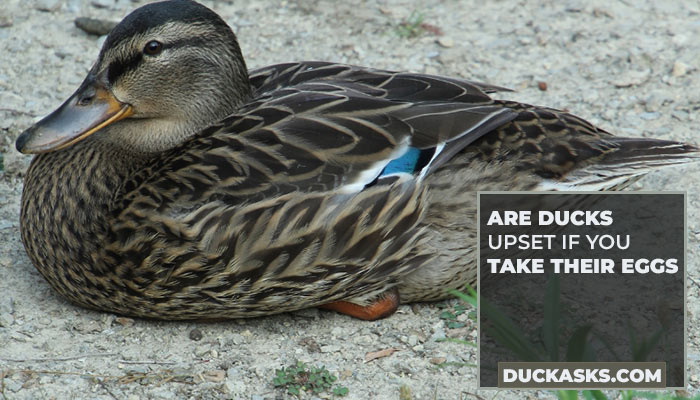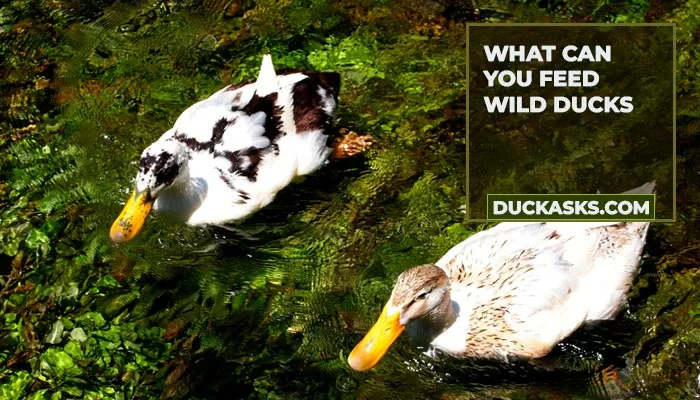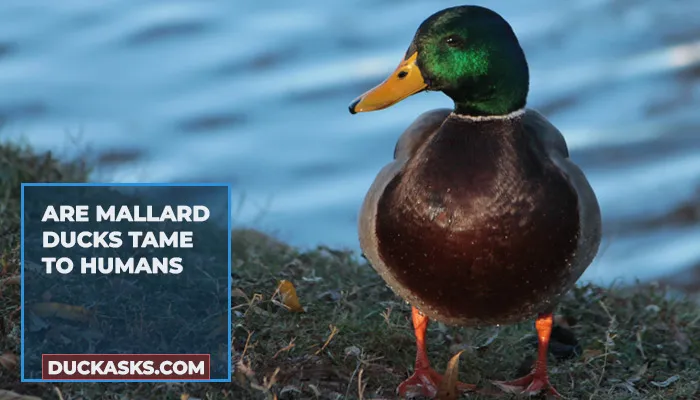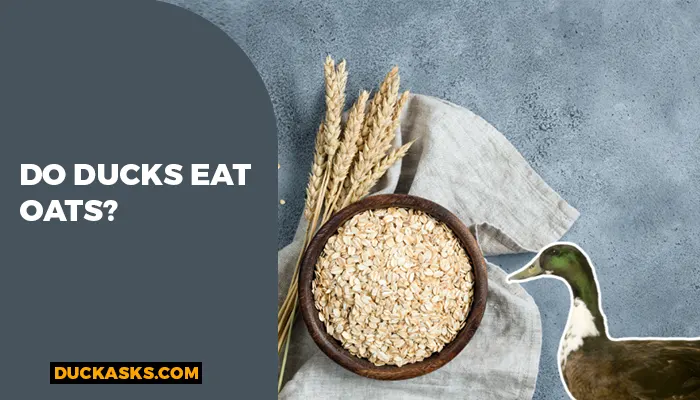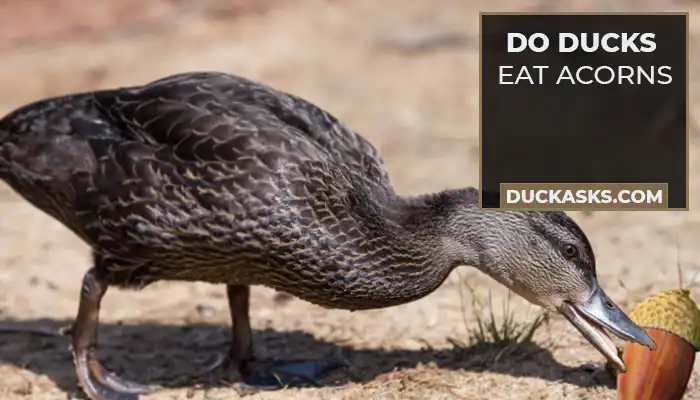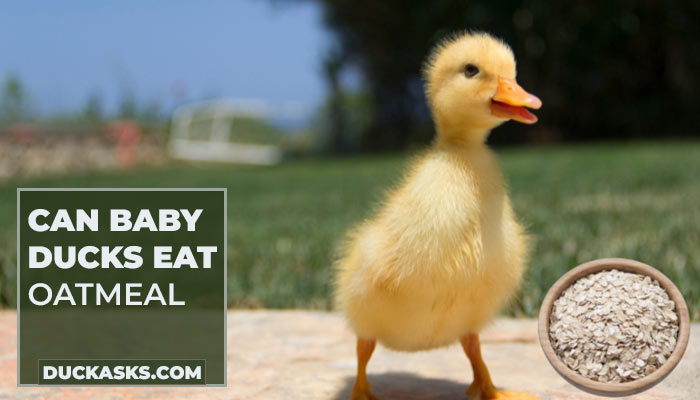Are Ducks Protective of Their Eggs?
You won’t probably believe it if I say that I was once chased by a duck. It looked amiable from a distance, but as soon as I went close to her nest, she started being defensive. And the first thing that came to my mind was, are duck’s protective of their eggs? Because that can be one valid reason to justify such behavioral changes.
And as this question was itching on my nogging, I started to do some research and found out ducks are indeed super protective of their ducklings, and even though they don’t look threatening, they still show a good fight if someone tries to vandalize their eggs or nests.
To put more emphasis on this topic, I have broadly discussed ducks’ protectiveness, behavioral changes, protection strategies, etc., in today’s article. Read along!
Read more about ducks behavior:
Does Duck Behavior Changes Before the Egg Hatches?
Well, duck behavior may change before the eggs hatch, but this can vary depending on the species of duck and the specific circumstances.
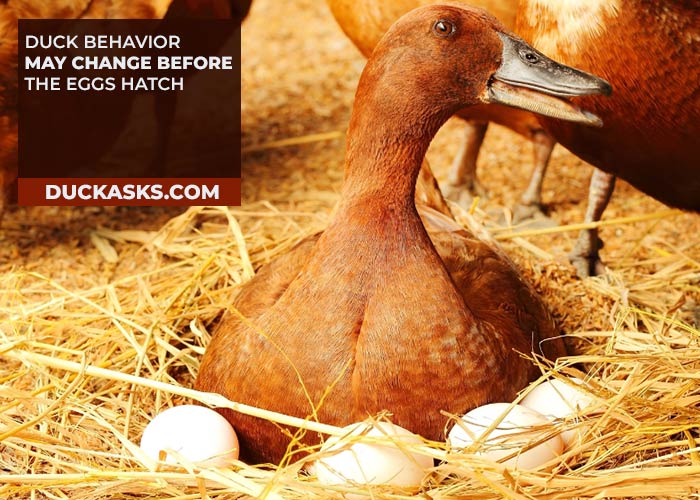
In general, female ducks are known for being attentive and protective of their eggs, and they may become more vigilant as the eggs near hatching.
This can involve-
- Spending more time sitting on the eggs to keep them warm and aggressively defending the nest from potential predators.
- Some ducks will also exhibit changes in their behavior as the eggs near hatching. For example, they may become more vocal or restless, possibly as a way of communicating with the chicks or signaling to other ducks that the eggs are about to hatch.
- In some cases, female ducks may also start to collect and carry nesting material, such as feathers or grass, to prepare for the chicks to emerge.
It is worth noting that not all ducks behave in the same way, and some species may be more or less attentive to their eggs than others.
Additionally, the specific circumstances surrounding the eggs, such as the presence of predators or other sources of stress, may also influence a duck’s behavior.
Ultimately, the behavior of ducks before the eggs hatch can be complex and varied, and a range of factors may influence it.
How Do Mother Ducks Behave After Giving Birth?
Mother ducks, also known as hen ducks, undergo a myriad of behavioral changes after giving birth, just like us humans. It can be exactly like post-maternity stress, frequent mood swings, overprotectiveness, severe attachment issues, etc.
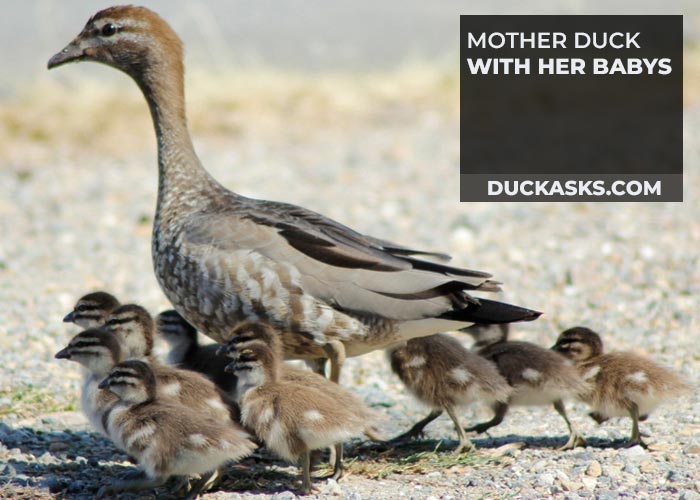
These changes are driven by their maternal instincts to protect and care for their young, known as ducklings. Immediately after giving birth, mother ducks will build a nest for their ducklings to live in.
As you already know, they gather materials such as grass, feathers, and moss and form them into a soft, warm nest. The mother duck will then spend a lot of time incubating her eggs and keeping them warm until they hatch.
Apart from incubating, the mother duck goes the extra mile to make sure that the ducklings grow up to be independent and strong enough to survive imminent adversities. For example-
Teaching Them Basic Survival Skills
Once the ducklings hatch, the mother duck will take on a more active role in their care. She will lead her ducklings out of the nest and onto land, where she will teach them to swim and forage for food.
The mother duck will also defend her ducklings fiercely against any perceived threats, using her wings and beak to protect them.
Being Emotionally Present
In addition to these physical tasks, mother ducks also display a range of behavioral changes as they care for their ducklings. They may become more vocal, communicating with their ducklings through soft coos and chirps.
Besides, they become more territorial, defending their territory against other animals or humans who come too close to their ducklings.
In short, mother ducks exhibit various behaviors after giving birth to protect and care for their young. These behaviors are driven by their maternal instincts and are crucial for the survival and development of their ducklings.
Do Ducks Guard Their Eggs?
Ducks do guard their eggs to some extent, but not in the same way that many other animals do.
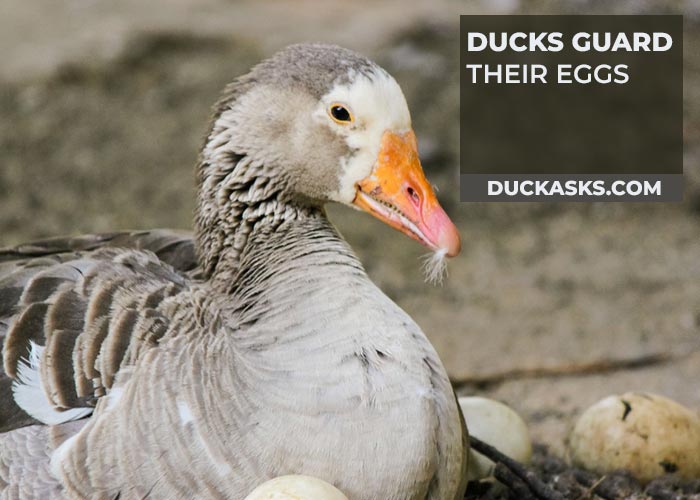
Let me break it down for you in a more detailed manner with clarity.
Ducks Retort in a Passive Way More Than an Aggressive way
Many birds, such as birds of prey and ground-nesting birds, will fiercely defend their nests and eggs from potential predators.
They will use their beaks and talons to attack anything that comes too close to their eggs. However, ducks tend to be less aggressive (not like they don’t throw a fit, they do but in a less aggressive manner in comparison) when it comes to protecting their eggs.
While they may become more vocal and alert when predators are nearby, they are generally more passive when it comes to defending their eggs.
One reason for this is that ducks often lay their eggs in more open and exposed locations, such as on the ground or in shallow water. This means that their eggs are more vulnerable to predators. As a result, ducks have evolved to rely on other strategies to protect their eggs. Such as,
Nesting in an Unreachable Place
Ducks will try to nest in areas where they feel safe, such as in tall grass or under bushes, to help hide their eggs.
Clutching
Another strategy is to lay their eggs in large groups, known as a clutch. By laying many eggs at once, ducks can curb the possibility of being completely childless. Even if some of their eggs are lost to predators, they still have a good chance of producing at least some offspring.
Using Physical Innuendos
Ducks will also use their body language to try and deter predators. When threatened, ducks may puff up their feathers, spread their wings, and make threatening noises to try and scare off potential predators.
How Do Ducks Protect Their Eggs from Predators?
Ducks are known for their strong maternal instincts and are highly protective of their eggs. There are several ways that ducks keep their eggs safe:
Nesting behavior
Ducks will build a nest in a secluded location, often in a tree or on the ground, where they feel their eggs will be protected.
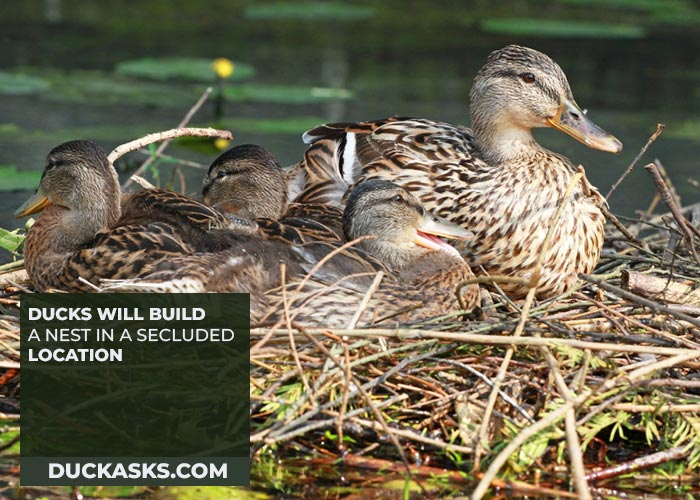
The nest is usually made of grass, twigs, and other materials that the duck gathers to create a comfortable and secure environment for the eggs.
Incubation
Once the eggs are laid, the female duck will take turns with the male (if there is one) incubating the eggs by sitting on them. This helps to keep the eggs warm and protected while they develop. The female will also defend the nest against any potential predators.
Camouflage
Some duck species have evolved to have eggs with coloring and patterns that blend in with their surroundings, making them less visible to predators.
Group protection
Some ducks, such as the mallard, will form an “egg raft” where a group of females will lay their eggs in the same nest. This not only helps to keep the eggs safe but also allows the females to take turns incubating the eggs and foraging for food.
Vocalizations
In addition to these physical measures, ducks will also use their vocalizations to deter predators. They will often make shrill, distinctive calls to alert the other ducks in the region about the advent of a predator.
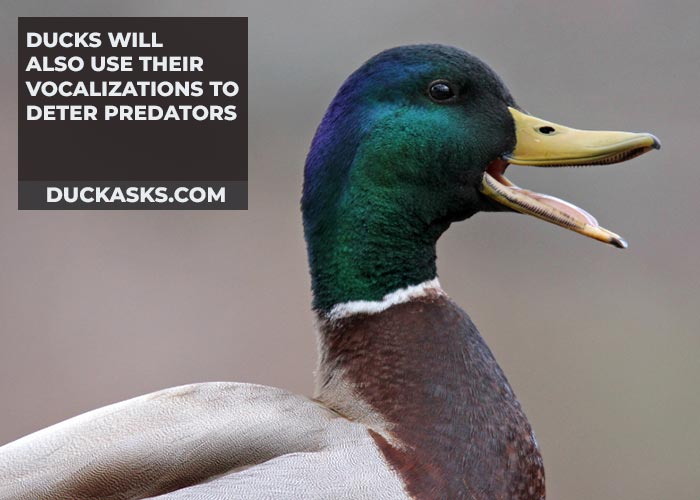
It’s like the secret code word that can only be divulged by them. Interestingly, the other ducks will bat for the potential victim ducks and flap their wings and bodies aggressively to protect their nest at all costs.
Overall, ducks have a handful of strategies for keeping their eggs safe. They build secure nests, incubate their eggs, use camouflage, and sometimes even seek the protection of a group.
These behaviors ensure that the eggs have the best chance of survival and allow the ducklings to hatch and grow into strong, healthy adults.
Why Do Ducks Cover Eggs with Feathers?
Ducks cover their eggs with feathers for several reasons. Let’s wade through them one by one!
Keeping Eggs Warm
One of the main reasons is to keep the eggs warm and protected. The feathers help to insulate the eggs and regulate their temperature, which is important for the development of the embryos inside.
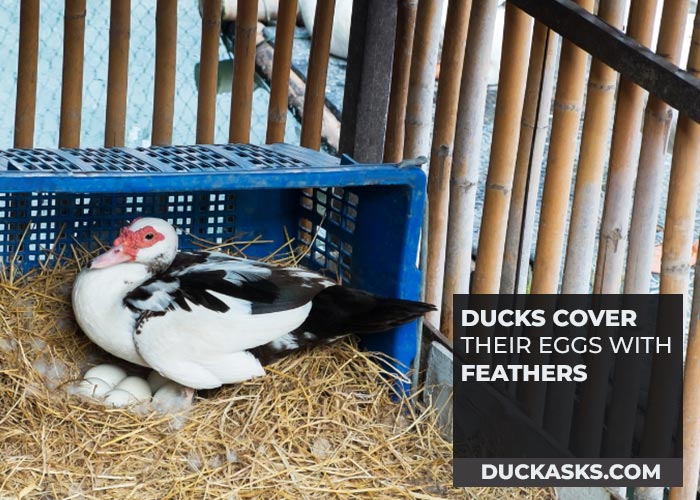
Ducks are known for being attentive parents, and both male and female ducks take turns incubating the eggs by sitting on them and keeping them warm with their feathers.
They also have a special gland near their tail that produces oil, which they use to preen their feathers and keep them clean and waterproof. When a duck covers her eggs with feathers, she uses this oil to create a layer of insulation over the eggs to help keep them warm.
Protection Against Predators
Another reason ducks cover their eggs with feathers is to protect them from predators. When a duck covers her eggs with feathers, it makes it more difficult for predators to spot the eggs and helps to camouflage them from view. This can help to reduce the risk of the eggs being damaged or eaten by predators.
Retaining Moisture
Covering eggs with feathers can also help to reduce moisture loss from the eggs. Ducks lay their eggs in a nest, which can sometimes be damp or humid.
Blending with the Surrounding
Another reason ducks cover their eggs with feathers is to help them blend in with their surroundings. Many ducks lay their eggs in nests made of materials like grass, leaves, or twigs, and covering the eggs with feathers helps them blend in and look more like part of the nest.
This can help keep the eggs safe from predators and make them less visible to other ducks, reducing the risk of infanticide.
In summary, ducks cover their eggs with feathers to keep them warm, protect them from predators, and help them blend in with their surroundings. This helps to ensure the survival and development of the embryos inside and is an important aspect of duck parenting behavior.
Are Father Ducks as Protective as Mother Ducks?
Father ducks, like male members of many animal species, generally play a less active role in parenting and protecting their offspring compared to mother ducks. This is because, in many species, including ducks, females often bear the majority of the responsibility for incubating eggs and caring for the young.
Some people tend to believe that male ducks only care about mating and don’t bat an eye when something happens to their babies. What they do is defend their spouses from other male ducks, or you can call them “rival males’ out of sheer jealousy or protectiveness.
However, they couldn’t care less when it came to their babies. This belief is widely popular and kind of internalized, although there are always exceptions, and some people believe that father ducks are protective, too (more or less). For instance –
Having the Fatherly Instinct
Male ducks, like all animals, have the instinct to protect their young and ensure their survival. However, the extent to which they are protective can vary depending on the species and individual duck.
Some male ducks may be more hands-on and actively help to care for and defend their offspring, while others may be more passive and leave most of the childcare to the female.
Playing the Role of a Provider
In many duck species such as mallard, domestic duck, marbled duck, the male’s primary role is to defend the territory and provide food for the family group. They may also help protect the young from predators, although the female usually leads the young to safety.
One way that male ducks can be protective is by participating in “mate guarding,” which involves staying close to the female and aggressively defending her and the eggs or young against potential threats.
This behavior is more common in species where the male plays a more active role in parenting, such as wood ducks and some species of geese.
Overall, while father ducks may not be as protective as mother ducks in some species, they still play an important role in the survival and protection of their young.
End Quote
So, what do you think? Is duck’s protective of their eggs? I am sure you are surprised by their amazing maternal instincts. Also, let’s not forget about how clever their protection strategies are.
However, it’s safe to say that not all ducks exhibit the same level of protectiveness, and some may be more hellbent on finding food and shelter than protecting their eggs.
That said, if you are interested in knowing more about ducks, feel free to stay connected with our socials. Find us on Twitter, Facebook, and Pinterest.
Image Credit: Canva.com/photos
Article References

